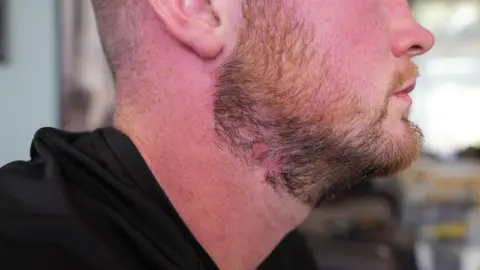Man nearly died from sepsis after popping spot
A man who nearly died from sepsis after popping a spot on his neck is warning others about the dangers of the potentially deadly condition.
Geraint Mullins, 24, from Newport, was at home watching TV when he noticed a pimple on his neck and popped it.
In less than a day the spot had turned into an abscess and he soon developed sepsis, requiring emergency hospital treatment and two operations.
Mr Mullins, who believes he is fortunate to be alive, wants others to be aware of the signs and symptoms of sepsis, which can be hard to recognise.
"I enjoy popping spots - and when I popped it, it was just a normal spot," said Mr Mullins, who works in the gas industry.
"[But] within a few days it grew into quite a large abscess."
Mr Mullins said he then started to show signs of sepsis.
"I was very lethargic, I was quite out of it, I didn't really know what was going on," he recalled.
He went to see his GP and was then rushed by ambulance to the Royal Gwent Hospital in Newport, where he had surgery to drain the abscess and was given intravenous antibiotics to fight the sepsis.

But the wound was still infected a week later, so Mr Mullins was rushed in for more surgery.
"I was very close to potentially not being here," he said.
Mr Mullins had undiagnosed ulcerative colitis and this, combined with the abscess that came from popping the spot, led to sepsis.
"Where the spot was popped, that's where it decided to attack," he said.
 From Geraint Mullins
From Geraint MullinsWhat is sepsis?
The NHS describes sepsis as a life-threatening reaction to an infection, which happens when the body's immune system overreacts to an infection and begins to damage tissues and organs.
You cannot catch sepsis from another person, and symptoms can be difficult to spot as they may appear similar to the symptoms caused by other conditions, including flu or a chest infection.
- Read more: What is sepsis? What are the symptoms?

Although the incident happened when Mr Mullins was 17, he now wants to raise awareness of the condition.
"I knew absolutely nothing [about sepsis]," he said.
"I had no clue what it was, I had never heard of it until I had it."
Doctors told Mr Mullins, who is an amateur footballer, that his fitness levels had helped him to survive.
"If I wasn't as fit, I could have been dead," he said.
"I would definitely encourage people to learn about it and educate themselves because it could be life-saving," he added.
"If I [now] see something that could potentially be infected, the first thing that will come to my mind is sepsis.
"I realise how lucky I am to still be here."
